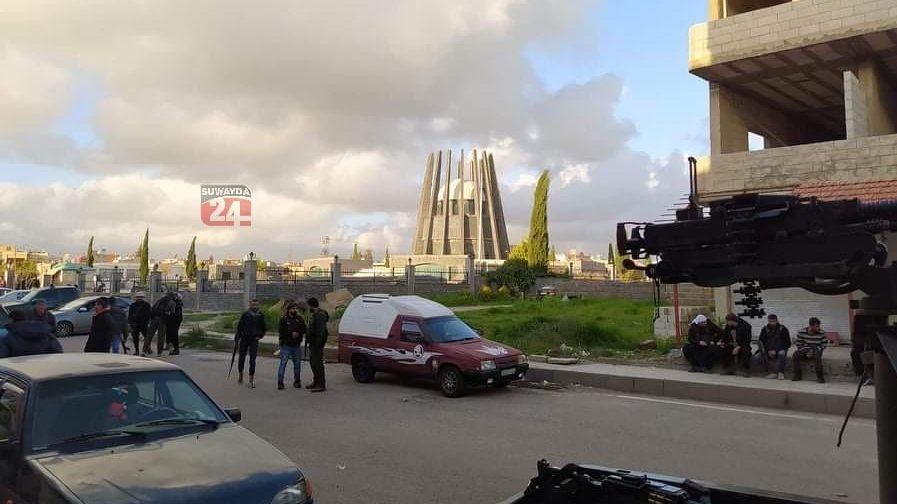Laith al-Baaous, son of the founder of the Men of Dignity Movement in Suweida, made eight separate demands to the Russian delegation during their meeting on Sunday evening.
A video has been posted among members showing Baaous, the son of Wahid al-Baaous, telling the Russian delegation that the people of Suweida reject Iran’s presence in the governorate. He stressed that they treat the Russians as “protectors of the Druze Almohad community.”
He accused Iranians of being responsible for the spread of drugs in Suweida, along with gang outbreaks, murders, poor living conditions, and “obstruction” in the area.
Read Also: After Suweida Episode: Changes in Regime”Military Security”
According to an exclusive source in Suweida for Al-Souria Net, the meeting was attended by a representative of the Syrian Brigade Party, religious and social figures, and a representative of Sheikh Hikmat al-Hijri.
The source confirmed that Ba’aous made eight demands to the Russian delegation: “refusing to conscript Suweida residents to serve in the army and limiting any service to Suweida governorate only,” “removing armed groups affiliated with Hezbollah and Iran from Suweida, rejecting any Iranian presence in Suweida, and considering anyone affiliated with Iran and Hezbollah as a legitimate target.”
The source indicated that the third demand was “to consider the security services of the Assad regime as an enemy of the Druze Almohad community, rejecting their continued presence in Suweida.” In addition, all detainees from Suweida should be released from Assad regime prisons without exception, ending arbitrary detention for Suweida residents.
The fifth demand stipulated that “the systematic policy of displacement practiced by the Syrian regime against the people of Suweida is rejected, in the form of depriving people the most basic services such as water and electricity, which stems from the corruption of officials running state institutions.”
The sixth demand includes “allowing international assistance to Suweida, opening safe corridors for the governorate away from the regime’s interference, which prevents aid from reaching the governorate,” and “allowing peaceful political action in Suweida, which is legitimate, even if it is opposed to the Syrian regime. An attack on any political or humanitarian activity that serves the governorate’s people demands a response.”
The final demands called for “the unification of Syrian territory, rejecting rumours promoted by the security services about the intention of Suweida’s people to secede from Syria.”
Last week, Suweida witnessed armed clashes between the Men of Dignity Movement and the Mountain Brigade on the one hand and the Fajr Forces group, led by Raji Falhout, on the other side.
The unprecedented confrontations in this way resulted in the local factions taking control of all the headquarters of the Falhout Group, killing and capturing most of the soldiers who followed him.
Falhout is accused of being linked to the Syrian regime’s Military Intelligence Division. There has been no comment from the Intelligence Division on what the governorate has witnessed so far.
Baaous said the clashes are the beginning of “eradicating Iran’s Shiite expansion” in the governorate.
Suweida governorate has a “unique” model of military and security forces, which are divided between local factions and formations, some with the opposition and others neutral.
A third section is loyal to the Assad regime and its security branches.
For months, insecurity in the Suweida governorate has escalated further, with clashes and kidnappings between local armed factions and groups considered pro-regime by local factions.
COMMENT FROM THE OBSERVER
On Monday, leaders of local factions in Tafs announced that a number of former members of the opposition left the town because the Syrian government had previously demanded their deportation.
Khaldoun al-Zou’bi, a former leader of the opposition and a leader of a local group, said in a statement that “an agreement has been reached with the people of the town for the exit of a number of people wanted by the government forces.”
The agreement came “to spare the town any military operations that might harm civilians and their property, and in order to stop the massive damage caused to farmers,” he added.
This article was translated and edited by The Syrian Observer. The Syrian Observer has not verified the content of this story. Responsibility for the information and views set out in this article lies entirely with the author.


